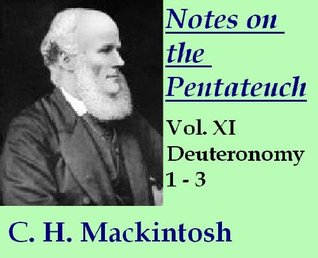Notes on the Penteteuch: Deut. 1 - 3
by C.H. Mackintosh
Commentary on Deuteronomy Chapters 1 - 3
"The character of the book on which we now enter is quite as distinct as that of any of the four preceding sections of the Pentateuch. Were we to judge from the title of the book, we might suppose that it is a mere repetition of what we find in previous books. This would be a very grave mistake. There is no such thing as mere repetition in the word of God. Indeed God never repeats Himself, either in His word or in His works. Wherever we trace our God, whether on the page of holy scripture, or in the vast fields of creation, we see divine fullness, infinite variety, marked design; and, just in proportion to our spirituality of mind, will be our ability to discern and appreciate these things. Here, as in all beside, we need the eye anointed with heavenly eye-salve. What a poor idea must the man entertain of inspiration who could imagine, for a moment, that the fifth book of Moses is a barren repetition of what is to be found in Exodus, Leviticus; and Numbers! Why, even in a human composition, we should not expect to find such a flagrant imperfection, much less in the perfect revelation which God has so graciously given us in His holy word. The fact is, there is not, from cover to cover of the inspired volume, a single superfluous sentence, not one redundant clause, not one statement without its own distinct meaning, its own direct application. If we do not see this, we have yet to learn the depth, force and meaning of the words, 'All scripture is given by inspiration of God.'" C.H.M.
"The character of the book on which we now enter is quite as distinct as that of any of the four preceding sections of the Pentateuch. Were we to judge from the title of the book, we might suppose that it is a mere repetition of what we find in previous books. This would be a very grave mistake. There is no such thing as mere repetition in the word of God. Indeed God never repeats Himself, either in His word or in His works. Wherever we trace our God, whether on the page of holy scripture, or in the vast fields of creation, we see divine fullness, infinite variety, marked design; and, just in proportion to our spirituality of mind, will be our ability to discern and appreciate these things. Here, as in all beside, we need the eye anointed with heavenly eye-salve. What a poor idea must the man entertain of inspiration who could imagine, for a moment, that the fifth book of Moses is a barren repetition of what is to be found in Exodus, Leviticus; and Numbers! Why, even in a human composition, we should not expect to find such a flagrant imperfection, much less in the perfect revelation which God has so graciously given us in His holy word. The fact is, there is not, from cover to cover of the inspired volume, a single superfluous sentence, not one redundant clause, not one statement without its own distinct meaning, its own direct application. If we do not see this, we have yet to learn the depth, force and meaning of the words, 'All scripture is given by inspiration of God.'" C.H.M.
BUY NOW
Kindle Edition, 80 pages
Published August 27th 2011
© 2025 Bibleportal.com 版权所有.

Charles Henry Mackintosh (1820-1896) was an Irish preacher, Bible expositor, and author. Active in the Irish Revival of 1859-1860. His first tract, in 1843, was "The Peace of God," and his last, shortly before his death in 1896, was "The God of Peace." Generally known as C.H.M., was one of the gifted writers of the Plymouth Brethren, so-called.
He was schoolmaster at Westport, County Mayo, Ireland, for a few years. But for the greater part of his life he devoted himself to evangelism and pastoral ministry as well as to religious journalism, as editor of the monthly periodical Things New and Old; and to religious literature. He was the author of the Notes by C. H. M, on all the books of the Pentateuch, which enjoyed great popularity, being sold in enormous quantity, especially in the United States.
... Show more